'Aging in place' considerations - are they effective?
prairiemoon2 z6b MA
8 years ago
last modified: 8 years ago
Featured Answer
Sort by:Oldest
Comments (25)
lam702
8 years agoprairiemoon2 z6b MA
8 years agoRelated Discussions
At what age does the judge take into consideration childs wishes?
Comments (19)I also think that if the kids have been living with you for 2 years without BM trying to get them back, that should have some merrit on getting placement back to you. From what I have read through the years, it is very difficult to change a custody arrangement once the child has lived somewhere for 2 years or more. Although, since you agreed to the change, it might be more difficult. I agree with the statement to get the child into counseling. Although, it might be more difficult since the BM is obviously keeping the children from you. Even if the physical placement doesn't change you definitely need to get a lawyer and get a very specific visitation schedule set for you. I can't even imagine going from the children living with me to not even being able to see them!...See More32"vs 34" doorways for aging in place
Comments (8)This isn't as easy as just saying, "Let's make the doors wide enough for a wheelchair". Consider: - What's easier than a large door? NO door. Obviously you want a door on your bedroom and bathroom . . . but look for places where you can ELIMINATE unnecessary doors; for example, extra doors in overly-compartmentalized bathrooms are a nighmare for people with walkers or wheelchaiars. Or, a compromise: Pocket doors, which you can leave open if mobility becomes a problem in the future. - If you find your doors aren't large enough, you can switch the hinges and get an extra 2" or so -- what're they called? Swing away hinges? - Remember that oversized doors take away space from furniture placement. If you're building a compact plan, this may matter to you. You are unlikely to end up using a wheelchair full-time, yet that's what people seem to plan for. More likely scenerios: - You're more likely to lose mobility due to the natural aging process rather than an accident. - You're more likely to need a cane than anything else. - You're more likely to need a walker than a wheelchair. - You're more likely to use a walker in the house and a wheelchair when you leave the house. - If you're using a wheelchair or wheelchair just for outings, do you have a spot by your everyday entrance where you can store your apparatus? These are big items to leave laying about. - If you're in a wheelchair only temporarily (or only for outings), you're likely to have an inexpensive manual chair; whereas, if you're in a wheelchair permanantly, you're probably going to spend on an electric chair. The electric chair is more narrow and needs less doorway space. - Walk-in closets and pantries are very popular, but will you be able to maneuver inside them if you need a walker or a wheelchair? Don't skimp on floorspace. - Garage doors matter too: If you end up in a wheelchair, you'll probably downsize to one vehicle. If you have ONE big garage door instead of two small ones, you'll be able to park in the middle of the garage and make use of the extra space to enter the vehicle. - Even if your garage entry is zero-degree entry, install grab-bars on both the inside and the outside. My grandmother had them, and they made an amazing difference for her. - Your floors may be more important than your doors -- they were for my grandmother, both for her walker and for her temporary wheelchair. A change from linoleum to carpet can cause a fall. Keeping your floors 100% flat is worth some effort. - Steps are an extension of your floors. Put effort into having at least one covered entrance (preferably your most convenient door, probably the one from the garage) that has no steps....See Moreaging in place construction
Comments (2)That's a tough call. I do wood for a living but have slate in a portion of my house and tile in one bathroom. I'd be hard pressed to pick only one thing. If I did, it would probably like the 16" multi-colored slate I have now, laid on diagonal. Another thing I've done for customers and really liked is Expanko Heirloom 1/2" cork. It's thick, comfortable under foot, can be refinished and is fairly tough. I'd rather stand on cork or even wood as I age rather than a piece of rock. If my slate ever fails I'll probably do a 3 color checkerboard. Bamboo is okay. There are better and lesser grades/brands. If I have to live with something for a long time I don't know that it would be Bamboo, especially if it was glued over concrete. I'd probably pick 3/4" x 4" rift and quarter sawn White Oak. It's fairly stable and tough, allows for refinishing in a huge array of colors and effects and should be readily available for the foreseeable future in case you have a mishap. It's wider than the norm but not so wide that I'd worry about stability. Even though I'm a wood person in general I'd be hard pressed to put finished wood on the exterior of a house....See MoreHelp With bathroom for aging in place, have vanity, need advice
Comments (15)Here's a good link to some aging in place building considerations: https://www.nahb.org/en/learn/designations/certified-aging-in-place-specialist/related-resources/aging-in-place-remodeling-checklist.aspx Non-slip options for flooring/tile, high rise toilet, grab bars for toilet area and in shower (don't forget one for when exiting-a shower door handle is not weight bearing), lever style handles and a hand-held shower sprayer come to mind as basic and essential from my work as a nurse in a senior living community. A 40 inch pathway seems tight to maneuver a rollator or wheelchair in a turn to access the toilet or the shower, but if either your designer or contractor has universal design experience, then perhaps they can make some suggestions about facilitating safe and easy movement in the space....See Morechisue
8 years agoalexamorrie
8 years agoprairiemoon2 z6b MA
8 years agomrspete
8 years agoNothing Left to Say
8 years agoMongoCT
8 years agoprairiemoon2 z6b MA
8 years agolam702
8 years agoprairiemoon2 z6b MA
8 years agolast modified: 8 years agosouthofsa
8 years agomrspete
8 years agolast modified: 8 years agoprairiemoon2 z6b MA
8 years agolast modified: 8 years agoprairiemoon2 z6b MA
8 years agoprairiemoon2 z6b MA
8 years ago
Related Stories
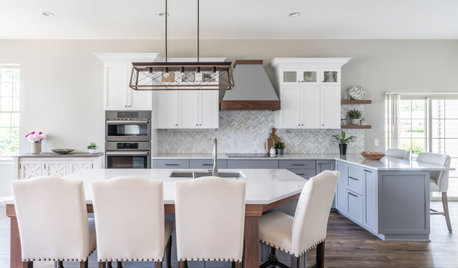
KITCHEN DESIGN10 Ways to Design a Kitchen for Aging in Place
Design choices that prevent stooping, reaching and falling help keep the space safe and accessible as you get older
Full Story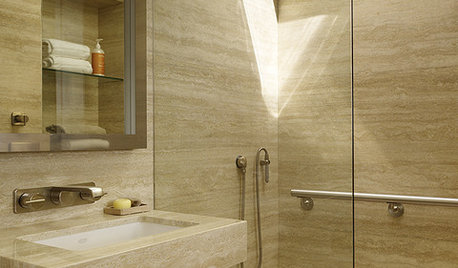
UNIVERSAL DESIGN12 Must-Haves for Aging in Place
Design a home that will continue to be accessible, safe and stylish as the years go by
Full Story
UNIVERSAL DESIGN11 Ways to Age-Proof Your Bathroom
Learn how to create a safe and accessible bathroom without sacrificing style
Full Story
ARCHITECTURETry a Four-Leaf Design That Spans the Ages
No one's sure exactly what the quatrefoil represents, but its striking effect in all kinds of designs is certain
Full Story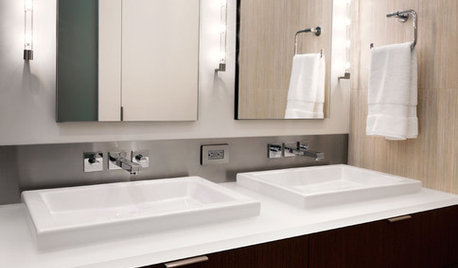
BATHROOM DESIGNUniversal Bath Design: Light Your Bathroom for All Ages and Abilities
Learn about uplighting, downlighting, visual cueing and avoiding glare for a bathroom that's safe and works for all
Full Story
LIFEThank U 4 the Gr8 Gift: How to Send Thanks in the Digital Age
We click open invitations and RSVP via text, but a handwritten thank-you is sometimes still best. Here's how to tell
Full Story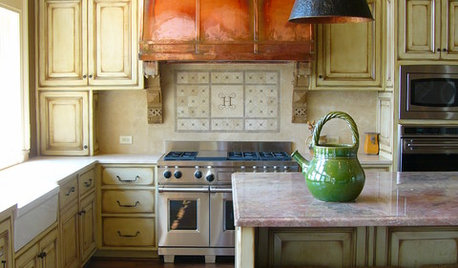
MATERIALSClever Combo: Aged Wood and Metal
Mixing distressed wood and metal makes for a potent design combination in a single furniture piece or an entire room
Full Story
LIVING ROOMSRoom of the Day: The Age of Elegance
When asked to remodel a classic Victorian, an interior designer channels her client’s style for a traditional yet contemporary look
Full Story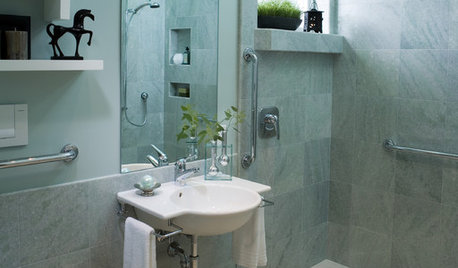
BATHROOM DESIGNHow to Design an Accessible Shower
Make aging in place safer and easier with universal design features in the shower and bathroom
Full Story
ARCHITECTUREDesign Workshop: The Intriguing Effects of Exposed Framing
Reveal the structure of your home for interesting design opportunities and eye-catching visual effects
Full StorySponsored
Columbus Area's Luxury Design Build Firm | 17x Best of Houzz Winner!



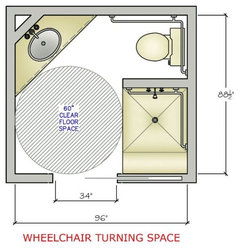
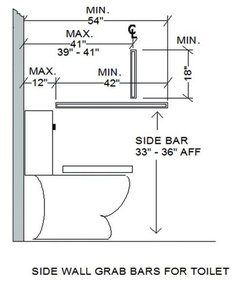




mrspete